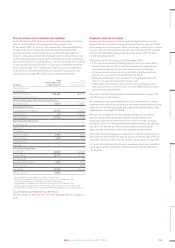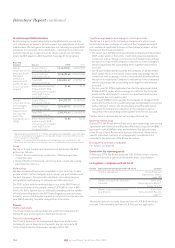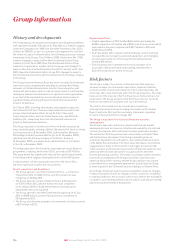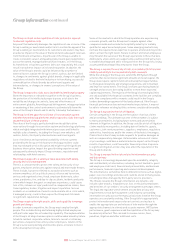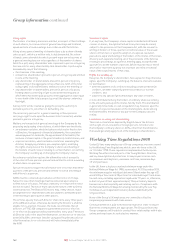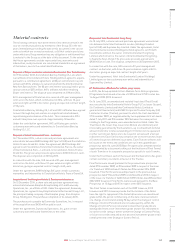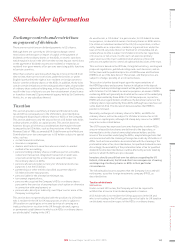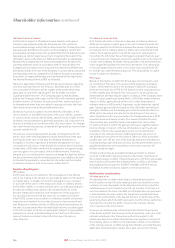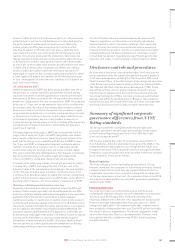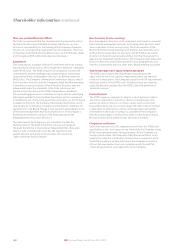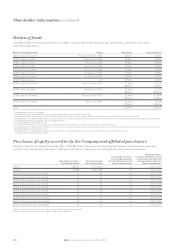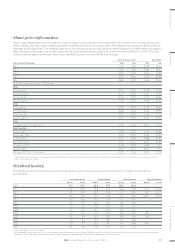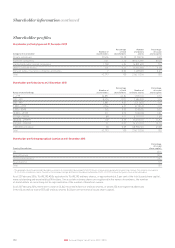Holiday Inn 2015 Annual Report Download - page 164
Download and view the complete annual report
Please find page 164 of the 2015 Holiday Inn annual report below. You can navigate through the pages in the report by either clicking on the pages listed below, or by using the keyword search tool below to find specific information within the annual report.Group information continued
Voting rights
The holders of ordinary shares are entitled, in respect of their holdings
of such shares, to receive notice of general meetings and to attend,
speak and vote at such meetings in accordance with the Articles.
Voting at any general meeting of shareholders is by a show of hands
unless a poll, which is a written vote, is duly demanded. On a show
of hands, every shareholder who is present in person or by proxy at
a general meeting has one vote regardless of the number of shares
held. On a poll, every shareholder who is present in person or by proxy
has one vote for every share held by that shareholder. A poll may be
demanded by any of the following:
• the chairman of the meeting;
• at least five shareholders present in person or by proxy and entitled
to vote at the meeting;
• any shareholder or shareholders present in person or by proxy
representing in the aggregate not less than one-tenth of the total
voting rights of all shareholders entitled to vote at the meeting; or
• any shareholder or shareholders present in person or by proxy
holding shares conferring a right to vote at the meeting and on
which there have been paid up sums in the aggregate at least equal
to one-tenth of the total sum paid up on all the shares conferring
that right.
A proxy form will be treated as giving the proxy the authority to
demand a poll, or to join others in demanding one.
The necessary quorum for a general meeting is three persons
carrying a right to vote upon the business to be transacted, whether
present in person or by proxy.
Matters are transacted at general meetings of the Company by the
proposing and passing of resolutions, of which there are two kinds:
• an ordinary resolution, which includes resolutions for the election
of Directors, the approval of financial statements, the cumulative
annual payment of dividends, the appointment of the Auditor, the
increase of share capital or the grant of authority to allot shares; and
• a special resolution, which includes resolutions amending the
Articles, disapplying statutory pre-emption rights, modifying
the rights of any class of the Company’s shares at a meeting of
the holders of such class or relating to certain matters concerning
the Company’s winding up or changing the Company’s name.
An ordinary resolution requires the affirmative vote of a majority
of the votes of those persons present and entitled to vote at a meeting
at which there is a quorum.
Special resolutions require the affirmative vote of not less than three
quarters of the persons present and entitled to vote at a meeting at
which there is a quorum.
AGMs must be convened upon advance written notice of 21 days.
Subject to law, other meetings must be convened upon advance
written notice of 14 days. The days of delivery or receipt of the notice
are not included. The notice must specify the nature of the business
to be transacted. The Board of Directors may, if they choose, make
arrangements for shareholders who are unable to attend the place
of the meeting to participate at other places.
The Articles specify that each Director shall retire every three years
at the AGM and, unless otherwise decided by the Directors, shall be
eligible for re-election. However, the Code recommends that all
directors of FTSE 350 companies submit themselves for election
or re-election (as appropriate) by shareholders every year. Therefore,
all Directors will retire and offer themselves for election or re-election
at the 2016 AGM, other than Jennifer Laing and Ying Yeh who will not
offer themselves for re-election and will retire immediately after
the AGM.
Variation of rights
If, at any time, the Company’s share capital is divided into different
classes of shares, the rights attached to any class may be varied,
subject to the provisions of the Companies Act, with the consent in
writing of holders of three-quarters in nominal value of the issued
shares of that class or upon the adoption of a special resolution
passed at a separate meeting of the holders of the shares of that class.
At every such separate meeting, all of the provisions of the Articles
relating to proceedings at a general meeting apply, except that the
quorum is to be the number of persons (which must be two or more)
who hold or represent by proxy not less than one-third in nominal
value of the issued shares of that class.
Rights in a winding-up
Except as the Company’s shareholders have agreed or may otherwise
agree, upon the Company’s winding up, the balance of assets available
for distribution:
• after the payment of all creditors including certain preferential
creditors, whether statutorily preferred creditors or normal
creditors; and
• subject to any special rights attaching to any class of shares,
is to be distributed among the holders of ordinary shares according
to the amounts paid up on the shares held by them. This distribution
is generally to be made in cash. A liquidator may, however, upon the
adoption of a special resolution of the shareholders, divide among
the shareholders the whole or any part of the Company’s assets
in kind.
Limitations on voting and shareholding
There are no limitations imposed by English law or the Articles
on the right of non-residents or foreign persons to hold or vote
the Company’s ordinary shares or ADSs, other than the limitations
that would generally apply to all of the Company’s shareholders.
Working Time Regulations 1998
Under EU law, many employees of Group companies are now covered
by the Working Time Regulations which came into force in the UK
on 1 October 1998. These regulations implemented the European
Working Time Directive and parts of the Young Workers Directive,
and lay down rights and protections for employees in areas such
as maximum working hours, minimum rest time, minimum days
off and paid leave.
In the UK, there is in place a national minimum wage under the
National Minimum Wage Act 1998, as amended. At 31 December 2015,
the minimum wage for individuals between 18 and under the age of 21
was £5.30 per hour and £6.70 per hour for individuals age 21 and above
(in each case, excluding apprentices aged under 19 years or, otherwise,
in the first year of their apprenticeships). This particularly impacts
businesses in the hospitality and retailing sectors. Compliance with
the National Minimum Wage Act is being monitored by the Low Pay
Commission, an independent statutory body established by the
UK government.
None of the Group’s UK employees are covered by collective
bargaining agreements with trade unions.
Continual attention is paid to the external market in order to ensure
that terms of employment are appropriate. The Group believes the
Group companies will be able to conduct their relationships with trade
unions and employees in a satisfactory manner.
162 IHG Annual Report and Form 20-F 2015



